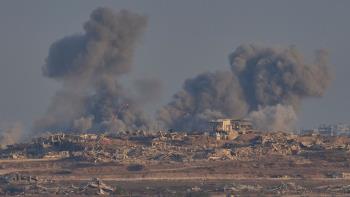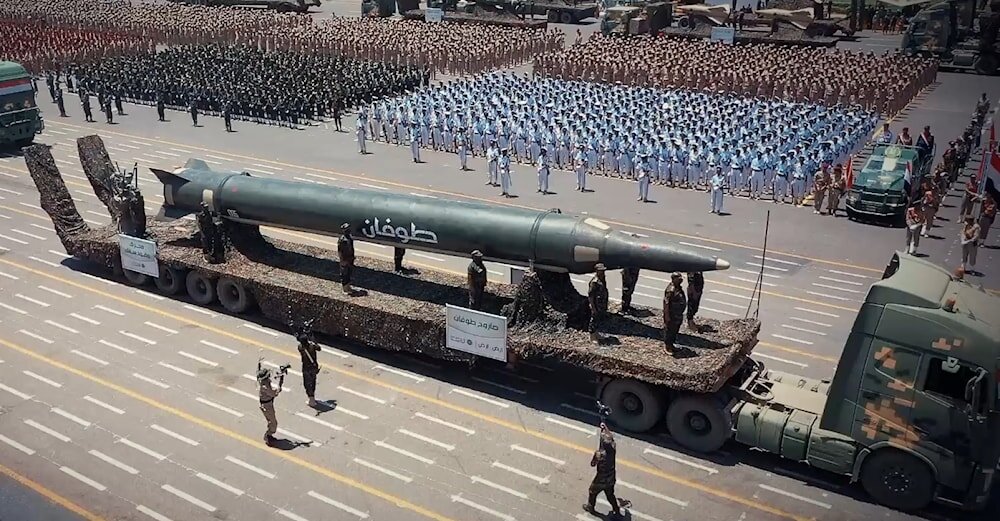Alwaght- After recent Israeli airstrikes on Yemeni capital Sana'a and assassination of the prime minister of National Salvation Government and a number of his cabinet ministers, all Yemeni leaders at various levels are unanimous about a resolute and regretful response to their Israeli enemy.
As the Yemeni threats escalate, speculations about how Sana'a will respond are rising and Ansarullah's warnings about a "tough response" and "real surprises" are indicating their resolve to respond to the Israeli aggression.
History shows that the Axis of Resistance has always acted on its promises. Now, Ansarullah, as a powerful member of this alliance, is determined to use all its means to deliver a strong and fitting response to the Israeli regime.
The Israelis' preparations for every potential scenario from the Yemenis are a clear sign that a painful retaliation with serious consequences is imminent.
What are Ansarullah's means for retaliation?
Given its military capabilities, Ansarullah has a set of choices to respond to Tel Aviv.
One of the most important choices is use of missiles and drones.
In recent years, Ansarullah has succeeded in developing ballistic and cruise missiles with varying ranges, which have repeatedly managed to hit strategic targets deep inside the occupied territories.
Given the small area of Israel, which has led to a concentration of this regime's vital and economic infrastructure—especially in port cities—strikes against energy facilities, military bases, airports, and logistical centers could significantly impact the regime's operational and psychological resilience.
A recent military achievement for Yemen is the cluster missiles, unveiled weeks ago during an attack on the occupied territories. The difficulty in intercepting these missiles, even for the Israeli multi-layered air defense systems, demonstrates the highly advanced and threatening capabilities of the Yemenis. The enemy is under severe pressure in facing such threats, and the renewed use of these missiles will undoubtedly complicate the situation for the Israeli occupation.
The leaders in Sana'a have also warned they possess capabilities even their allies are unaware of, emphasizing that they have many "surprises in store for the Zionist enemy." These remarks send a clear message of Yemen's readiness and deterrent power against the aggressions of the Israeli regime, which will alter the future equations of deterrence in the region.
Furthermore, Yemen's domestically-developed long-range drones play a special role in anti-Israeli operations. Drones are capable of attacking targets that are difficult for missiles to reach directly. Drone operations also reduce the risk for Ansarullah's ground forces and can significantly increase the element of surprise.
The combined use of missiles and drones is an effective strategy for applying direct pressure on Tel Aviv and responding to the assassination of Yemeni officials. In recent days, a number of Yemeni drones have attacked the occupied territories via the Red Sea and even the Mediterranean, demonstrating their ability to target the occupied territories from various routes in the west and east. These maneuvers obviously showcase the operational power and extensive reach of the Yemenis.
Since the Red Sea is one vital route for navigation of Israeli ships, Sana'a can disrupt its trade through planting sea mines or directly attacking the vessels and thus mount economic pressure on Tel Aviv.
Over the past two years, the movement has effectively halted Israeli shipping in these waters by carrying out large-scale missile strikes and destroying or seizing several vessels. Should this pattern continue as a form of retaliation, it could inflict irreparable damage on Tel Aviv.
At the same time, in the digital age, cyberattacks have become a central element of modern warfare. Ansarullah has the capability to target Israel’s digital and communications infrastructure. Penetrating computer networks, exposing sensitive information, and disrupting critical systems are among the cyber options the group could employ for retaliation.
Cyber warfare offers distinct advantages: it requires no direct presence on the battlefield and carries a strong element of surprise. When combined with missile or drone strikes, it could significantly amplify the impact of operations.
Ansarullah can also apply psychological pressure on Israel through overt threats and media campaigns. Announcing plans for retaliation, publicizing its military capabilities, and aligning with groups or states opposed to the Israeli occupation could heighten both political and security pressures on Tel Aviv.
Israelis take shelter underground
Frequent warnings of Yemenis about a tough revenge have left substantial psychological impacts on the occupied territories and now the Tel Aviv leaders are extensively afraid of retaliation.
Yedioth Ahronoth has reported that the Israeli cabinet sessions have been held in a secret and highly guarded place after the recent assassination attack on Sana'a. Walla news of Israel is preparing for possible Yemeni attacks. Citing sources in the air force, Walla reported that Yemenis are capable of domestically making missiles and drones and may resort to challenging air defense and detection systems. So, the air force had strengthened itself locally.
Holding Netanyahu’s cabinet sessions in underground shelters to stay safe against missile and drone attacks of Ansarullah is an implicit admission to Yemen's capabilities, showing that the enemy is extremely afraid of the power, precision, and range of Ansarullah's military capabilities. This means that Tel Aviv can no longer protect its security even at home, to an extent that now it is on a defensive mode as its enemies have managed to bring the shadow of war on the occupied territories.
While earlier Tel Aviv was promoting itself as an invincible power, today it is not only afraid of Hamas and Hezbollah, but also it sees Yemenis as posing an existential threat from thousands of kilometers away. This bears witness to the fact that the time of claimed Israeli power and hegemony in the region is gone.



























